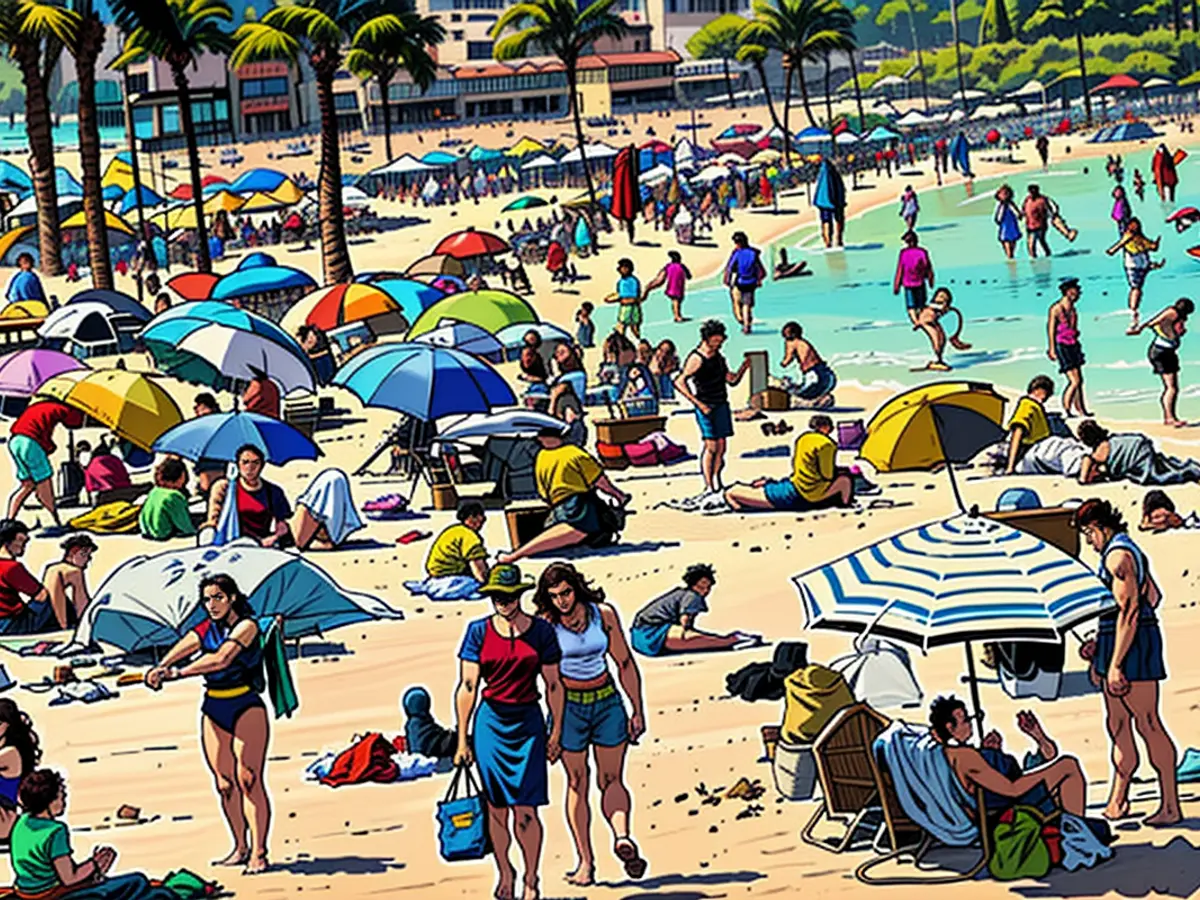In Spain, anger grows against the onslaught of tourists
Economically, Spanish holiday regions are reliant on the tourism industry. Simultaneously, locals are bitter about the lack of living space and rising living costs - with relatively low wages. Thousands of them will protest again on Mallorca in the evening.
On the poster advertising the large demonstration against mass tourism on Mallorca, holiday planes, private jets, cruise ships, and luxury yachts encircle the small island like a swarm of flies. "Change the course" (Canviem el rumb) is written above the photomontage for the demonstration announced for Sunday evening in the island capital Palma. It's about "Setting limits on tourism," it says in smaller print on the poster. For every local, there are 15 tourists.
Lighter said than done. On the Balearic Islands, whose main island is Mallorca, there are about 1.2 million locals. Last year, they were visited by 18 million tourists, of whom 4.6 million were from Germany and 3.4 million from the UK. Or rather, they were "invaded," as more and more locals see it.
Invited to the demonstration is a group called "Less Tourism, More Life." According to Marga Ramis, one of the movement's responsible figures, over 100 associations and organizations have joined, as reported by the "Mallorca Newspaper." Two months ago, up to 25,000 people demonstrated in Palma under the slogans "Say no!" and "Mallorca is not for sale!"
The unrest is not limited to Mallorca but also occurs in other Spanish tourist metropolises like Barcelona and Málaga and on the Canary Islands. This time, the protesters want to get closer to the tourists, so there can be no doubt who they mean. The train is supposed to pass through the narrow streets of Palma's Old Town, where many tourists are usually found.
Wages between 1000 and 1800 Euro per month
Tourism is undoubtedly crucial for Mallorca. The industry accounts for 45% of the island's economic output. And the tourism industry warns against cutting off the branch on which many sit. They pumped around 20 billion Euros into the island's coffers last year. However, demonstrators complain that only a minority profits while the vast majority receives low-wage jobs in the tourism industry, which do not cover the increasingly expensive housing. In addition, traffic jams, noise, and dirt irritate the islanders, who begin to feel foreign in their own home amidst so many strangers.
In Spanish media, reports on the precarious working and living conditions of employees in the tourism industry are multiplying. "I work in the maintenance of a British villa and earn between 1500 and 1800 Euros a month," a 37-year-old from Ibiza told the newspaper "El País." In February, he was evicted from his apartment due to a rent increase. He could no longer afford the 1000 Euros a month rent for a room and has been living in a caravan on the outskirts of a Swedish furniture store since then. He showers at a friend's place.
His "neighbors," also in tight financial situations, reportedly earn between 1000 and 1500 Euros a month. "Welcome to Ibiza" with its two elite nightclubs and a life on the parking lot, wrote the most important newspaper in the country. But what would happen if the demonstrators were successful and many tourists were deterred, nobody can really imagine. "I understand the discontent of many residents, but I implore that such demonstrations do not, like in Barcelona, turn into violence against tourists and residents," said the conservative regional government head of the Balearic Islands, Marga Prohens, to the "Mallorca Newspaper."
Plakates in Barcelona: "Tourists go home"
In the Mediterranean metropolis of Barcelona, thousands of demonstrators have called for restrictions in the tourism industry due to rising living and accommodation costs at the beginning of the month. Guests of popular restaurants for tourists were sprayed with water pistols. "Tourists go home. You are not welcome" was written on carried placards. Barcelona's socialist mayor, Jaume Collboni, plans to increase the tax for cruise tourists and no longer renew licenses for vacation rentals.
The German politics have meanwhile addressed the issue. The CDU tourism expert Anja Karliczek told the "Rheinische Post" that tourists from Germany secure jobs and generate tax revenues, which in turn flow into local infrastructure investments. The tourism sector is an "essential part of the economic performance not only on Mallorca." Karliczek also expressed understanding for the anger of locals. "But of course, overtourism also causes problems," she said.
Similarly, the Greens in the Bundestag expressed themselves. Tourism expert Matthias Gastel of the faction told the paper: "If housing shortages, water scarcity, and garbage mountains are the consequences of island tourism, which is characterized by mass instead of quality, then action in the interest of humanity and nature is necessary."
Island president Prohens also sees it that way. "We want to establish a social and political pact to make the islands more sustainable," she said. The tourism industry has created hundreds of thousands of jobs and prosperity, but it must also be socially acceptable, and people must feel good about it, she added. "Tourists are welcome on the Balearic Islands, and that will remain so," Prohens assured.
- The protests against mass tourism in Mallorca also gain support from organizations in Barcelona and Málaga, as well as on the Canary Islands, indicating a widespread discontent across popular Spanish tourist destinations.
- The Alliance 90/The Greens in Germany's Bundestag shares concerns about the negative impacts of mass tourism on the environment and quality of life, emphasizing the need for a shift towards more sustainable practices.
- In response to the demonstrations, regional government head Marga Prohens of the CDU in the Balearic Islands calls for a balanced approach, acknowledging the economic benefits of tourism while also addressing the concerns of local residents.
- In an effort to make tourism more sustainable and socially acceptable, the president of the Balearic Islands, Island president Prohens, proposes establishing a "social and political pact" involving all stakeholders, including the tourism industry and local communities.






